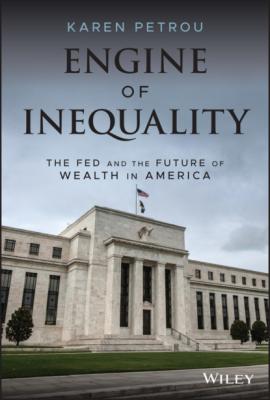Engine of Inequality. Karen Petrou
Чтение книги онлайн.
Читать онлайн книгу Engine of Inequality - Karen Petrou страница 15
 href="https://www.federalreserve.gov/releases/z1/dataviz/dfa/distribute/table/#quarter:117;series:Corporate%20equities%20and%20mutual%20fund%20shares;demographic:networth;population:all;units:shares">https://www.federalreserve.gov/releases/z1/dataviz/dfa/distribute/table/#quarter:117;series:Corporate%20equities%20and%20mutual%20fund%20shares;demographic:networth;population:all;units:shares.
href="https://www.federalreserve.gov/releases/z1/dataviz/dfa/distribute/table/#quarter:117;series:Corporate%20equities%20and%20mutual%20fund%20shares;demographic:networth;population:all;units:shares">https://www.federalreserve.gov/releases/z1/dataviz/dfa/distribute/table/#quarter:117;series:Corporate%20equities%20and%20mutual%20fund%20shares;demographic:networth;population:all;units:shares.41 40. Michael Batty, Jesse Bricker, Joseph Briggs, Elizabeth Holmquist, Susan McIntosh, Kevin Moore, Eric Nielsen, Sarah Reber, Molly Shatto, Kamila Sommer, Tom Sweeney, and Alice Henriques Volz, “Introducing the Distributional Financial Accounts of the United States,” FRB Finance and Economic Discussion Series (FEDS) 2019-17 (March, 2019), available at https://www.federalreserve.gov/econres/feds/files/2019017pap.pdf.
42 41. David Willetts, “Intergenerational warfare: Who stole the millennials' future?” Financial Times, July 3, 2019, available at https://www.ft.com/content/0c2a575a-8c4b-11e9-b8cb-26a9caa9d67b.
43 42. Alex J. Pollock, Finance and Philosophy: Why We're Always Surprised (Philadelphia: Paul Dry Books, 2018), available at https://books.google.com/books?id=7DmqDwAAQBAJ&pg=PT88&lpg=PT88&dq=Alex+Pollock+trillion+from+savers&source=bl&ots=HmHZvstfmO&sig=ACfU3U0pFdc5g3_n6EtwPv3evRNMrw-J_A&hl=en&ppis=_e&sa=X&ved=2ahUKEwiJwdDUz_7nAhXMlnIEHbH4BTAQ6AEwAXoECAoQAQ#v=onepage&q=2.4&f=false.
44 43. Jeanna Smialek, “Powell Says Federal Reserve Crossed Red Lines to Help Economy,” New York Times, May 29, 2020, available at https://www.nytimes.com/2020/05/29/business/economy/powell-federal-reserve-economy-coronavirus.html.
45 44. BIS, “Annual Economic Report 2019,” 56 (June 20, 2019), available at https://www.bis.org/publ/arpdf/ar2019e.pdf.
46 45. Libra, “Introducing Libra: A simple global currency and financial infrastructure that can empower billions of people,” Libra.org, June 23, 2019, available at https://libra.org/en-US/wp-content/uploads/sites/23/2019/06/IntroducingLibra_en_US.pdf.
47 46. Tom Wheeler, “Who makes the rules in the new Gilded Age? Lessons from the industrial age inform the information age,” Brookings Institution Center for Technology Innovation, December 12, 2018, available at https://www.brookings.edu/research/who-makes-the-rules-in-the-new-gilded-age/.
48 47. Jonathan Fisher, David Johnson, Timothy Smeeding, and Jeffery Thompson, “Estimating the Marginal Propensity to Consume Using the Distributions of Income, Consumption, and Wealth,” FRB-Boston Working Papers No. 19-4 (February 2019), available at https://www.bostonfed.org/publications/research-department-working-paper/2019/estimating-the-marginal-propensity-to-consume-using-the-distributions-income-consumption-wealth.aspx.
49 48. Cynthia L. Doniger, “Do Greasy Wheels Curb Inequality?” FRB FEDS 2019-021 (March 12, 2019), available at https://www.federalreserve.gov/econres/feds/files/2019021pap.pdf.
50 49. Council of Inspectors General on Financial Oversight, U.S. Department of Treasury, Annual Report of the Council of Inspectors General on Financial Oversight 43 (July 2012), available at https://www.treasury.gov/about/organizational-structure/ig/Documents/CIGFO%20Document/508_CIGFO%20Annual%20Report.pdf.
51 50. John Kenneth Galbraith, “A Journey Through Economic Time,” Interview by Brian Lamb, Booknotes C-SPAN, November 13, 1994, available at https://www.c-span.org/video/?60409-1/a-journey-economic-time.
Chapter 2 How Unequal Are We?
For the first time in decades, we are no longer simply concentrating wealth in the hands of a few. We're concentrating and creating the most inclusive economy ever to exist. We are lifting up Americans of every race, color, religion, and creed.
– President Donald J. Trump*
If President Trump is right, then the rest of this book is a waste of time. Why bother to show that post-crisis financial policy has made Americans even more unequal or devise ways to fix it for equality's sake if we aren't unequal?
The answer lies in the data deluge that is to come in this chapter. Normally, loads of numbers are many numbers too many. However, when a president and many of his advisers and supporters insist that America is equal and then some, it is vital to demonstrate that America has been increasingly unequal since 1980, that it was at levels of income and wealth inequality not seen since World War II before COVID hit, that many other nations are more equal than the US, that African Americans were even more unequal in 2019 than before the civil rights era, and that all of these underlying trends skyrocketed to unprecedented inequality when post-crisis financial policy changed the distribution of wealth in the US starting in 2010. It will take some time to count COVID's long-term impact on American economic inequality, but the ravages it wrought on household wages and employment show irrefutably that the pandemic made inequality worse along with pretty much everything else it touched. Reforming financial policy is thus a still more urgent equality priority.
Economic Inequality Fundamentals
Throughout this book, I refer to “economic inequality” even though much popular discussion focuses on “income inequality.” The reason to focus more broadly on economic inequality is that there are at least two key components that determine the have-a-lots, have some, and have-nots in the US and across the globe.
First indeed comes income. This is what you and others in your household earn from the fruits of your labor (i.e., from your job), the benefits you get from the government minus the taxes you pay, and what you earn from your savings accounts and investments (including pension income and capital gains). Although different ways to count “income” in the Tax Code have different statistical effects, income